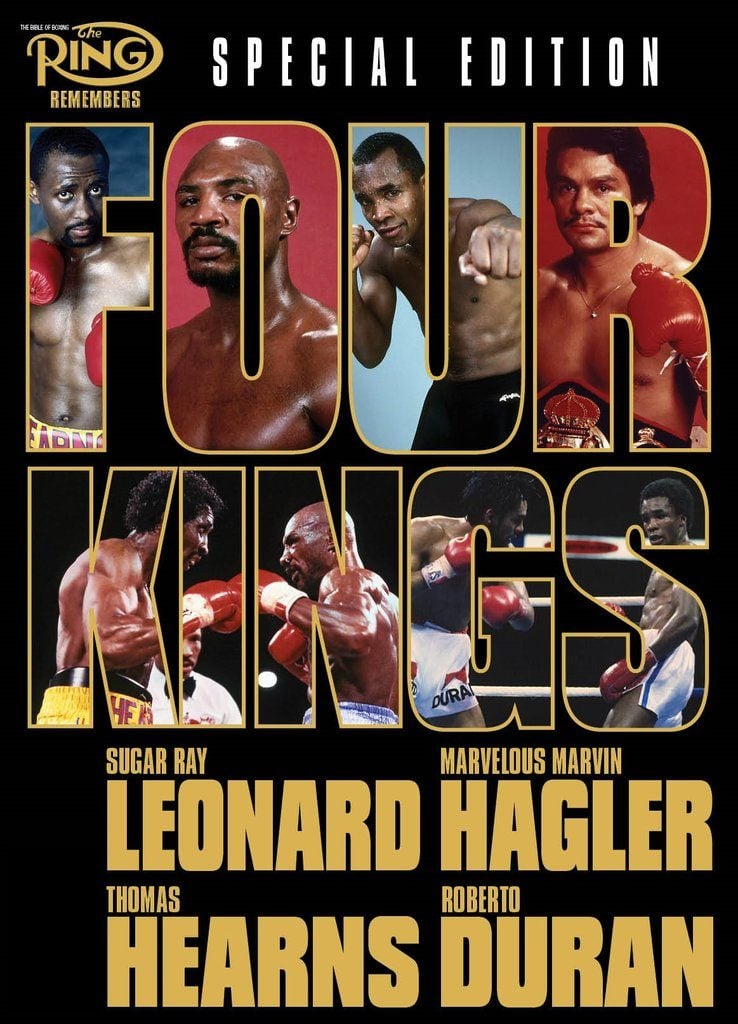Best I Faced: Sam Soliman
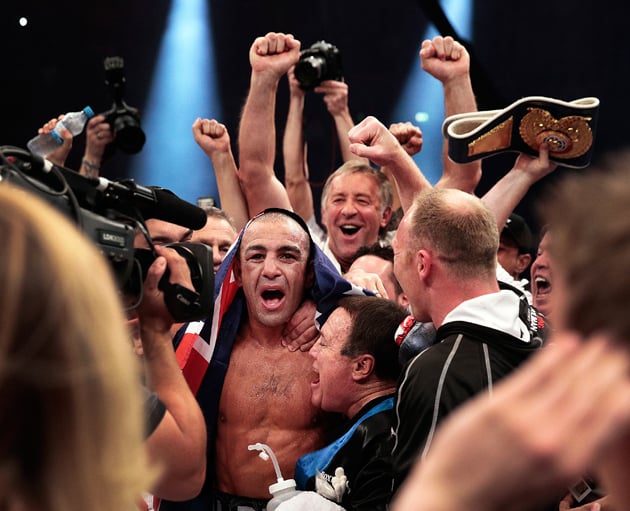
Hardnosed Sam Soliman lost several fights on his way up the professional ladder but never let the hard-luck defeats affect him. He stunningly won the IBF middleweight title on the road as a rank outsider in 2014.
Soliman was born in Melbourne, Australia, on November 13, 1973. He first encountered boxing when he was 14, watching Muhammad Ali, Sugar Ray Leonard and his favorite, Pernell Whitaker on TV.
“I loved sport and my favorite subject at school was physical education,” Soliman told The Ring. “After school each day, I used to fill my bag up with plenty of books so that it would weigh me down as I ran home and to boxing gym, making this a part of my training for the day.”
During that time, Soliman alternated between boxing and kickboxing. He later won ISKA and WKA world kickboxing titles.
Soliman was close to competing at the Commonwealth Games but the passing of his coach Frank Kenny hit him hard and he was unable to pursue that goal. He completed his amateur career with a record of 73-11.
In April 1997, Soliman made his professional debut. In just his second fight, at cruiserweight, he won the national title. Just two months later, he dropped down to junior middleweight where he lost to Kevin Kelly in a national title fight. He later won national titles at middleweight and super middleweight.
In his 15th professional outing, Soliman traveled to England and stopped Neville Brown in nine rounds to win the vacant Commonwealth middleweight title. After dropping a split decision to countryman Anthony Mundine, Soliman’s record stood at 12-7. World titles seemed to be a pipe dream to anyone else but Soliman.
“You could almost have named me a ‘journeyman battler,'” he said. “My record was deceiving because I had 10, 12-round championship fights against some of the best boxers in our country and having them so early in my career is pretty much unheard of. I had no doubt I was going to go on to win the world title.
“I knew that if I was managed correctly, fought fighters in my respective weight division, instead of accepting opportunities because they looked great but disadvantaged me in the process or taking fights on short notice. I believe that having no management is the only reason why I kept coming unstuck.
“I looked for and found a man, David Stanley, who took me under his wing and resurrected my career. He and I made a pact that we would never fight out of my weight division again and never to take fights on short notice.”
Soliman settled into the middleweight division where he bested experienced campaigner Sean Sullivan, future super middleweight titleholder Sakio Bika and previously unbeaten Nader Hamdan and gained revenge against Raymond Joval.
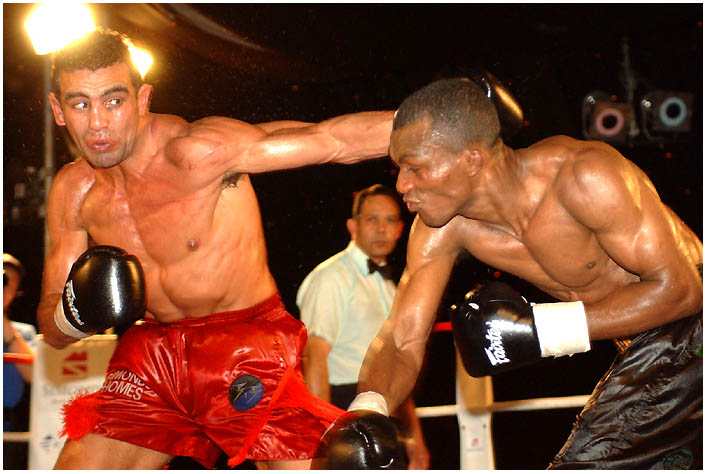
Sam Soliman (left) vs. Sakio Bika
A 19-fight win streak helped earn him a world title eliminator against future Hall-of-Famer Winky Wright. Soliman gave a good account of himself but lost a unanimous decision.
Again Soliman found himself on the losing end of some fights, including two against Mundine. He righted the ship with seven wins to earn a shot at IBF middleweight titlist Felix Sturm in Germany, in February of 2013.
The Australian shook off a second round trip to the canvas to edge Sturm to claim the IBF strap. However the BDB suspended Soliman for illegal use of methylsynephrine; the fight was changed to a no-contest and the title was returned to Sturm. The charge was later overturned but the result stood.
Soliman returned to Germany for a rematch 15 months later and used his greater work rate to beat Sturm by unanimous decision.
“Winning the world title was almost everything to me,” he said proudly. “Hence why I lived away from home, away from my family and made sacrifices that were bigger than any I’ve ever made before. Saying the words “It was worth it,” is an understatement because there is no better reward and feeling than being the middleweight champion of the world.”
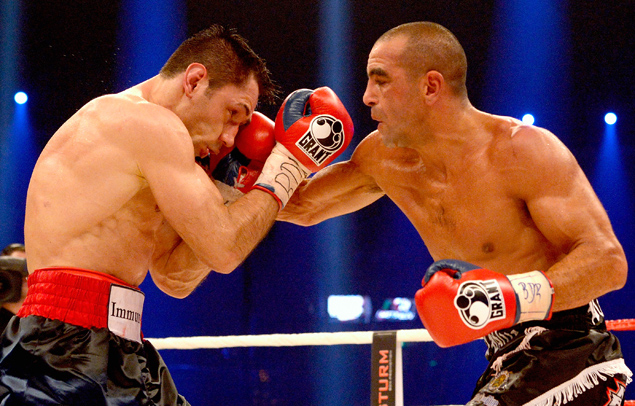
Sam Soliman (right) vs. Felix Sturm
The Australian lost the title in his first defense against Jermain Taylor. Already hampered by a bad style match-up, his chances were further diminished when he tore his ACL in Round 5. To his immense credit, he gutted the fight out but dropped a 12-round unanimous decision.
Soliman lost back-to-back fights against Dominic Wade and big-punching Sergiy Derevyanchenko after returning from injury. He brought the curtain down on his 22-year career with a record of (46-14-1, 19 knockouts) with two no-contests.
Soliman, now 46, is married to Maria and has two children. He lives in Melbourne and runs a boxing gym in partnership with his former manager David Stanley called Sam’s Stable. He also helps the homeless and less fortunate.
He graciously took time to speak to The Ring about the best he fought in 10 key categories.
BEST JAB
Jermain Taylor: After watching Jermain beat one of the legends of our sport, Bernard Hopkins, I trained my mind to not be overwhelmed by his achievements and view him as another one of the many champions I’d fought in the past. In training camp, my coach set up a drill poking a broomstick with a glove on the end of it targeting me over and over, as I defended and countered over and over. This worked a treat for the four rounds I had my legs under me before tearing my ACL in Round 5. I’ve faced three or four very fast-handed boxers with excellent jabs but what made Jermain’s jab special it was never telegraphed – no shoulder twitch, no movement of the hip. You only knew when it was coming when it was on its way. It was a long spearing jab.
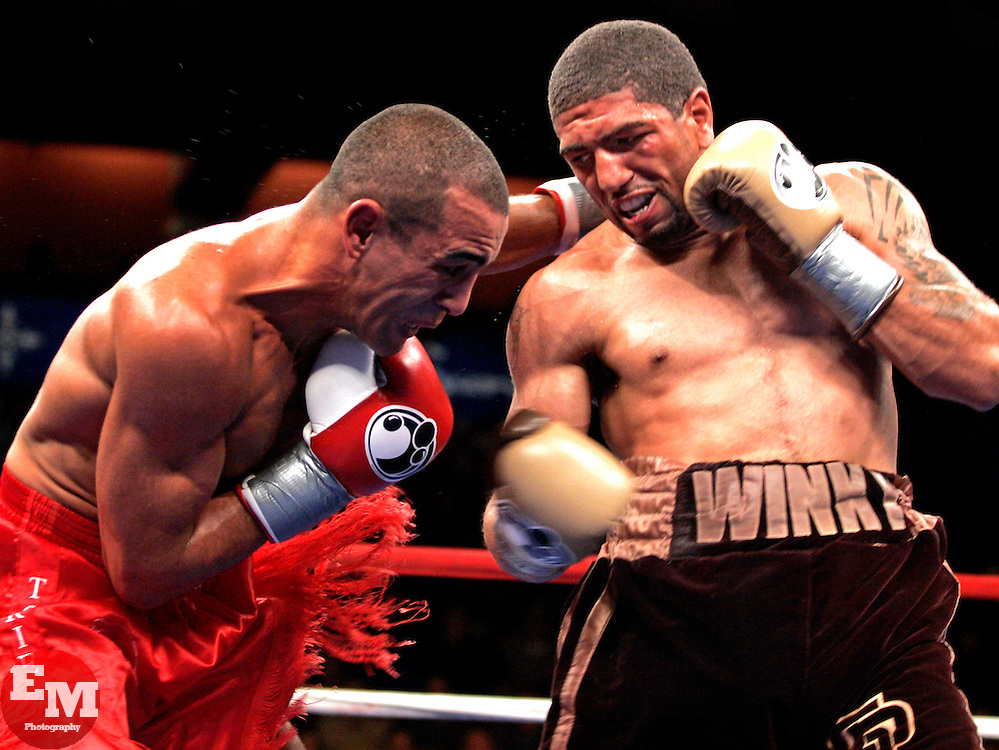
Winky Wright (right) vs. Sam Soliman. Photo credit: Ed Mulholland/WireImage.com
BEST DEFENSE
Winky Wright: Winky was only ever in punch range when he wanted to be. I have never fought a man whose forearms were as solid as his. They were like a brick wall and combined with his ability to read the play, know where the punches were coming from, made him the best defensive boxer I ever faced.
BEST HANDSPEED
Anthony Mundine: Mundine’s hands were as fast as his mouth. His hands were so fast because he was so relaxed. That relaxed state enabled him to ping out the punches.
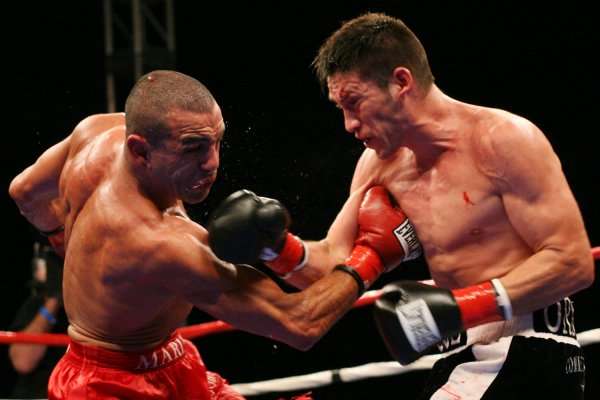
Sam Soliman (left) vs. Enrique Ornelas. Photo credit: Tom Casino/Showtime
BEST FOOTWORK
Enrique Ornelas: I really loved fighting Mexican Enrique Ornelas because we were literally toe-to-toe for 12 rounds. Footwork was both our strengths. Also fighting him on his side of the world was a sweet victory.
SMARTEST
Howard Eastman: He was able to adjust to my unorthodox style, when I outboxed him in the first four rounds of our bout. He worked out that I was scoring on him when he was in my punch range, so he adjusted the range, keeping me on the outside to use his full reach advantage. He timed me with perfection as I came in and then kept me at his distance throughout the rest of the fight.
STRONGEST
Felix Sturm: Sturm – who we snatched the title off by unanimous decision as an 8-to-1 underdog – was my strongest opponent. I was able to break him down round after round but he still kept coming and that was over 24 rounds. Sturm delivered the hardest body punch I ever received. I promised myself that I would never let him know…until reading The Ring now [laughs]. He also provided me with the highlight of my career.
BEST CHIN
Nader Hamdan: I threw a 1,000 punches that night and had him rattled at times. He had an iron chin and just like his fight name “Lionheart,” he was one of the toughest fighters I have ever came across in my 177 amateur and pro fights combined.
BEST PUNCHER
Eastman: Eastman was 29-0 (with 27 KOs). In the two fights that he won on points, both those opponents only just survived. I studied his footage prior to our stoush. Halfway through our fight, I went back to the corner and told my trainer, “Dave, it feels like he’s not even wearing gloves.” He hit that hard. It was one of the few fights in my career I’d ever been bloodied. He won a close decision but the crowd were unbelievably chanting my name in his hometown after the decision. I personally believe he edged the decision.
BEST BOXING SKILLS
Kevin Kelly: Kelly had the skills to entertain anyone who watched. It was a real chess game as we both used our ring smarts over the 12 rounds. It was my third professional fight. [It was] such a great beginning in my career, to fight a champion of his caliber, over 12 rounds for the Commonwealth title.
BEST OVERALL
Wright: This man had it all. He was the most composed; he had exceptional timing, countering and [was] an all-round great world champion.
Michaela Hall, David Stanley and Stuart Gillespie helped coordinate this feature. The Ring appreciates their assistance.
Questions and/or comments can be sent to Anson at [email protected] and you can follow him on Twitter @AnsonWainwright.
THE FOUR KINGS SPECIAL
available on pre-order now at
THE RING SHOP (Click Here)



